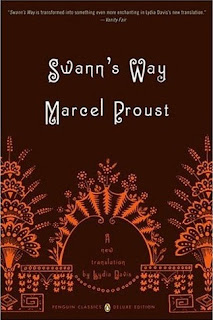The Oregon Trail (The Library of America, 1991)
by Francis Parkman
USA, 1849
For a book that I'd checked out of the library several months ago and then basically overlooked month after month after month, Francis Parkman's 1849 travel classic
The Oregon Trail--a riveting first-person account of the then 23-year old Parkman's trip out west along about half of the Oregon Trail in 1846--delivered all the nonstop reading entertainment that I could ask for during the short amount of time that it was actually in my hands. What a fantastic read. A marvelous--if often merciless--observer, the recent Harvard grad and future eminent historian Parkman's colorful travel diary is laced with anecdotal scorn for almost everybody he ran into during the course of his journey--be they frontier emigrants ("some of the vilest outcasts in the country" [13]), Mormons ("armed fanatics" [333]), or any of the dozens of American Indian tribes he encountered along the trail ("savages" for the adults or "miniature savages" for the children). Given his unabashed racism toward non-whites in general and Native Americans in particular, I should probably note that Parkman's period prejudices, while unflattering in the extreme, actually acount for some of the most fascinating clash of culture moments in the text. He claims, for example, that he had "come into the country almost exclusively with a view of observing the Indian character. Having from childhood felt a curiosity on this subject, and having failed completely to gratify it by reading, I resolved to have recourse to observation" (111). To this end, in one of the highlights of the work, he recounts an extended pit stop spent among the Sioux Indians in the Black Hills country. So what does this representative of Christian "civilization," who has already declared that the Indian soul is "dormant" from a spiritual point of view (99), manage to take away from his anthropological moment in the sun? In one of the more uncomfortable moments, we get this confession:
For the most part, a civilized white man can discover but very few points of sympathy between his own nature and that of an Indian. With every disposition to do justice to their good qualities, he must be conscious that an impassable gulf lies between him and his red brethren of the prairie. Nay, so alien to himself do they appear, that having breathed for a few months or a few weeks the air of this region, he begins to look upon them as a troublesome and dangerous species of wild beast, and if expedient, he could shoot them with as little compunction as they themselves would experience after performing the same office upon him. Yet, in the countenance of the Panther, I gladly read that there were at least some points of sympathy between him and me. We were excellent friends, and as we rode together through rocky passages, deep dells and little barren plains, he occupied himself very zealously in teaching me the Dahcotah language (242-243).
I have to admit that the first time I read this passage, I was more than a little creeped out by Parkman's apparent willingness to exterminate members of a tribe who had offered him hospitality. Upon rereading the passage tonight, I'm now more struck by the mutual mistrust and suspicion that must have marred many potential white-native friendships similar to this one. I think Parkman was very honest in that regard, and it's just this sort of unvarnished candor--more than his observational skills or his often-amusing tendency to badmouth others or the unfortunate racism on display--that helps make his narrative such bracing and compelling reading even today. In any event, an unexpectedly juicy delight. (
www.loa.org)
Francis Parkman at age 20
Abandoned Furniture on the Prairie
Parkman's descriptions of his Indian encounters are so fascinating from a historical point of view that it's easy to overlook the way that he manages to make the mundane seem memorable in less adventurous moments along the trail. Here's one of my favorite quiet moments from early on:
It is worth noticing, that on the Platte one may sometimes see the shattered wrecks of ancient claw-footed tables, well-waxed and rubbed, or massive bureaus of carved oak. These, many of them no doubt the relics of ancestral prosperity in the colonial time, must have encountered strange vicissitudes. Imported, perhaps, originally from England; then, with the declining fortunes of their owners, borne across the Alleghanies to the remote wilderness of Ohio or Kentucky, then to Illinois or Missouri; and now at last fondly stowed away in the family wagon for the interminable journey to Oregon. But the stern privations of the way are little anticipated. The cherished relic is soon flung out to scorch and crack upon the hot prairie (84).
More on Parkman
Amateur Reader (Tom) has written four interesting pieces on Parkman to date. They can be found
here,
here,
here, and
here in the order they were written (all recommended, natch).
























